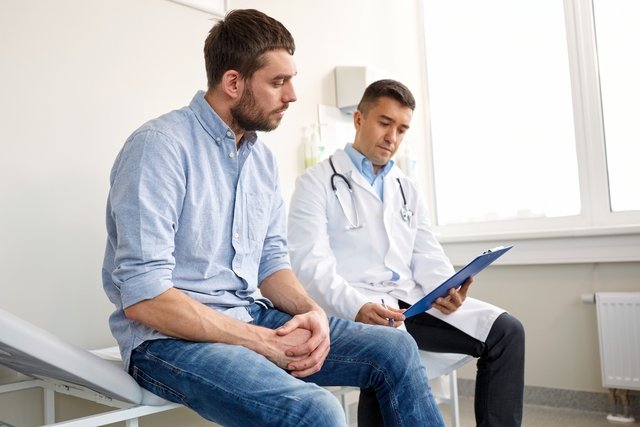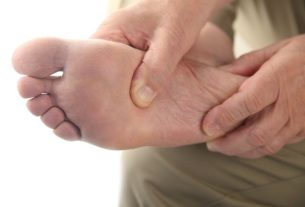Mucus in the stool can be caused by intestinal infection, food intolerance, intestinal obstruction, anal fissure, Crohn’s disease, ulcerative colitis or irritable bowel syndrome, and should be investigated by a gastroenterologist.
The presence of mucus in feces is not always a sign of illness and can be considered normal, as it is produced to lubricate the intestine and is mixed with feces. However, if you notice symptoms other than mucus, such as constant diarrhea, abdominal pain or bloating, it is important to consult a gastroenterologist or general practitioner to identify the cause and begin the most appropriate treatment.
Treatment for mucus in feces must be guided by the gastroenterologist according to the cause, and changes in diet, fluid replacement and/or use of medications may be indicated.

What causes mucus in stool
The main causes of mucus in stool are:
1. Food intolerance
Food intolerances and allergies, such as sensitivity to lactose, fructose, sucrose or gluten, cause inflammation of the intestinal walls when food comes into contact with the mucosa, generating an increase in mucus production, which can be observed in feces.
In these cases, other symptoms may also appear such as belly swelling, diarrhea, red spots on the skin, excess gas or constipation, for example.
What to do: if there is a suspicion of having an intolerance to some type of food, it is important to consult a gastroenterologist to carry out an intolerance test and confirm the diagnosis, before eliminating any type of food from the diet. See 7 signs that may indicate gluten intolerance and when to suspect lactose intolerance.
2. Gastroenteritis
Gastroenteritis appears when some type of microorganism, such as bacteria or viruses, manages to infect the stomach and intestines, causing, in addition to excess mucus in the feces, intense nausea, diarrhea, vomiting, loss of appetite, fever and abdominal pain.
Typically, this type of problem arises due to the consumption of contaminated water or food, but it can also happen after prolonged use of antibiotics, as good bacteria are eliminated from the intestinal mucosa, facilitating the development of more harmful ones.
What to do: in case of suspicion, it is important to consult a gastroenterologist or a general practitioner, to confirm the diagnosis and initiate appropriate treatment, which may only include fluid replacement, but can also be done with antibiotics, if a bacterial infection is suspected. .
3. Irritable bowel syndrome
Irritable bowel syndrome causes changes in the intestinal rhythm that can increase the amount of mucus in the stool. Although it can happen in all cases of irritable bowel syndrome, mucus is more common in people who have long periods of diarrhea.
Other common symptoms of those suffering from irritable bowel include abdominal pain, excess gas, a swollen belly and periods of diarrhea that alternate with constipation, especially during periods of high stress or anxiety.
What to do: if there is already a diagnosis of irritable bowel, you should try to avoid excess stress by participating in leisure activities, but also eat a more careful diet, avoiding the consumption of coffee and foods with a lot of fat or spicy, for example. If there is only a suspicion of irritable bowel, you should go to the gastroenterologist to assess whether this really is the problem, starting treatment guided by your doctor.
See, in the following video, some eating tips to alleviate irritable bowel symptoms:
4. Crohn’s disease
Crohn’s disease is a chronic intestinal disease that causes constant inflammation of the intestinal walls, resulting in signs such as mucus in the stool, but also intense abdominal pain, fever, bloody diarrhea and weakness.
Although there is still no specific cause for Crohn’s disease, this disease can appear at any stage of life, especially in people with a family history of autoimmune disease. See what symptoms could be a sign of Crohn’s disease.
What to do: Generally, treatment for Crohn’s disease varies depending on the intensity/severity of the disease. It may include changes in eating habits, use of corticosteroids, immunosuppressants or biological therapy.
5. Intestinal obstruction
Intestinal obstruction happens when something prevents the passage of feces through the intestine. Therefore, the most common causes include hernias, torsion of the intestine, ingestion of some type of object or even a tumor in the intestine.
In these cases, mucus is produced in excess to try to push the feces, which end up not passing and generating other symptoms such as belly swelling, intense abdominal pain, excess gas and a decrease in the amount of feces.
What to do: intestinal obstruction is an emergency that needs to be treated to avoid serious complications such as bowel dilation or rupture. Therefore, if this problem is suspected, you should go to the hospital immediately.
6. Anal fissure
Anal fissure is a relatively common problem that consists of the presence of a small wound in the rectum region, which normally appears due to excessive bowel movements, which can happen in the case of frequent diarrhea, for example. However, cravings can also occur in cases of constipation, as the act of defecating very hard stools can end up damaging the sphincter.
When it appears, the fissure gives rise to symptoms such as bright red blood in the stool, pain when defecating, mucus in the stool and itching in the area.
What to do: the most important thing in these cases is to maintain adequate intimate hygiene, but you can also take sitz baths to relieve pain and apply ointments to heal the fissure more quickly. Furthermore, you should avoid drinking alcoholic beverages and spicy foods with lots of condiments, giving preference to a diet rich in fruits, vegetables and cereals. See some examples of ointments used in treatment.
7. Ulcerative colitis
This is an intestinal change that causes the presence of ulcers in the intestine and constant inflammation of the mucosa. Thus, in people with ulcerative colitis, stools are often accompanied by blood, pus or mucus.
Other symptoms that help identify a case of ulcerative colitis include diarrhea, very severe abdominal pain, skin lesions and weight loss.
What to do: you should seek assistance from a nutritionist to adjust your diet. Additionally, depending on the severity of the disease, medications may be needed to reduce intestinal inflammation.
8. Cystic fibrosis
Cystic fibrosis is a genetic disease that causes the body to produce thick, viscous mucus that is difficult to eliminate, accumulating inside the organs, mainly in the lungs and gastrointestinal tract, causing respiratory and digestive symptoms. Learn more about cystic fibrosis.
In this way, mucus can obstruct the pancreatic ducts, causing poor absorption of food, promoting excess gas, diarrhea or constipation, abdominal pain and large, fatty and mucus-filled stools.
What to do: It is recommended to consult a gastroenterologist so that the most appropriate treatment can be indicated, which may involve the use of digestive enzymes that facilitate the process of digestion and absorption of nutrients. In some cases, surgery may also be necessary.
9. Colon cancer
Colon cancer, or colorectal cancer, is a type of cancer that affects the large intestine, which can cause symptoms such as anemia, abdominal pain, weight loss, constipation, diarrhea and the presence of blood or mucus in the stool.
This type of cancer can occur in people who have risk factors, such as a family history of colon cancer, smoking, excessive consumption of alcohol and/or red meat, obesity and diabetes. Check out other situations that increase the risk of colon cancer.
What to do: It is recommended that the gastroenterologist be consulted so that a detailed assessment can be carried out and tests can be indicated to confirm the diagnosis, such as colonoscopy, for example, and the best treatment can be initiated, which may include chemotherapy, radiotherapy and/or surgery.
Which doctor to consult
When mucus in the stool is accompanied by other symptoms, it is important that a gastroenterologist is consulted so that an evaluation can be carried out and the cause of the mucus can be identified.
Taking care of your health has never been easier!

Sign up for our newsletter and stay up to date with exclusive news
that can transform your routine!
Warning: Undefined array key "title" in /home/storelat/public_html/wp-content/plugins/link-whisper-premium/templates/frontend/related-posts.php on line 12
Warning: Undefined array key "title_tag" in /home/storelat/public_html/wp-content/plugins/link-whisper-premium/templates/frontend/related-posts.php on line 13



